Hassell Talks
Hassell Talks is a conversation between designers and the world, exploring the transformative power of design to make the our built environment a better, more inclusive place. In this series you’ll hear from architects and urbanists, place makers, researchers and designers alongside incredible guests on how we’re reimagining and re-thinking our built environment - and beyond - and designing places people love: creating a more equitable, sustainable and thriving future for everyone.
Episodes
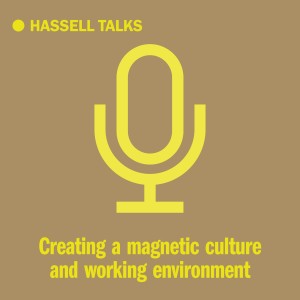
Thursday Sep 29, 2022
The 2022 Workplace Futures Survey. With Daniel Davis and Domino Risch
Thursday Sep 29, 2022
Thursday Sep 29, 2022
When it comes to how workers feel about their workplace, it's hard to mount an argument against three years' worth of data and insights into possibly the most disruptive period for workers in memory. Senior Researcher Daniel Davis has been studying the effects and challenges facing workplaces in our Annual Workplace Futures Survey since 2020, and this year the survey grew to include 2,500 office workers across Australia, China, Singapore, the United States and the United Kingdom.
And while foot traffic is returning to central business districts on the weekends — weekday activity remains far below pre-pandemic levels. People are returning to the city but not to work. So how do we attract people back to the workplace and — after over two years of remote and hybrid working — is there reason enough for them to even be there?
In this episode of Hassell Talks, join Daniel and Principal Domino Risch as they share some behind the scenes insights and explore the top three takeouts from our latest annual workplace survey. To find out more, and download your own copy of the report, visit The Magnetic Workplace: 2022 Workplace Futures Survey
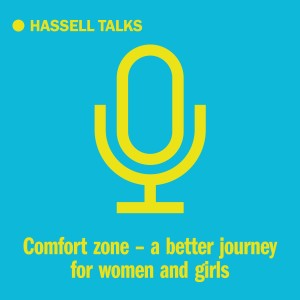
Wednesday Sep 14, 2022
Wednesday Sep 14, 2022
Rail precincts don't always feel like the safest places to be for women, girls and the gender diverse, particularly after dark.
Alert and constantly on guard, it's a relentless navigation of sightlines, lighting, exposure, surveillance and positioning for safety.
As designers, we believe we can do more than simply meet the governing standards and technical requirements demanded of rail stations - we can change the way people feel while using them, creating a more equitable and prosperous society.
Hassell partnered with the team at Monash University's XYX Lab to gather data and a better understanding of the design elements that shape women's perceptions of safety. What we discovered was that through materiality, better lighting design, wayfinding, sightlines and even access to toilets - we can make a big difference into how safe many parts of our population feel.
To explore the findings and see how Hassell is embedding them into our design process on our projects, we brought Principles Alix Smith and Chris Lamborn together with Associate Professor Nicole Kalms for an episode of Hassell Talks.
This episode was recorded in Naarm, on the lands of the Wurundjeri Woi-Wurrung people of the Kulin nation. We pay our respects to Elders past and present, and acknowledge Aboriginal and Torres Straight Islander people as the First Australians and Traditional Custodians of the land we live and work on.
This episode was produced by Prue Vincent, Julia Mahony and Annie Scapetis.
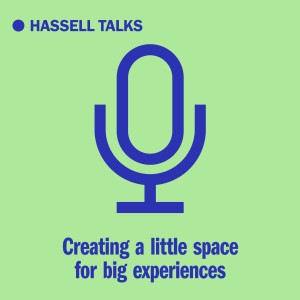
Tuesday Aug 23, 2022
Tuesday Aug 23, 2022
Welcome back to Season 4 of Hassell Talks! This season we're taking a look at Designing for a New State of Togetherness.
We believe good things - great things - can happen when people come together through seemingly spontaneous experiences.
The emotional response we get when we’re surprised or delighted is hugely powerful. It can help us feel more connected to others, and our cities. It can inspire and move us toward great change - and great change is something our cities, communities and planet urgently needs.
But how do we design for spontaneity? Is this not inherently contradictory?
We asked Principal and previous Hassell Talks host Jon Hazelwood to return to the microphone for a conversation with FreeState’s Su Lim around the role of spontaneity in our cities and how we can curate spaces for the unplanned.
Su and Jon discuss how to design for experiences that we don’t always know we need but that can connect and reconnect us in novel and essential ways that will create memories and reset cities.
We discuss the role of landscape and nature in creating surprise and delight in cities and, with Hassell Principal Chong Wang, explore how one of the world’s great cities, Shanghai, has woven spontaneity into its DNA. We also hear from Hannah Fox, the creator of Melbourne’s renowned Rising Festival, about how spontaneous interactions feed creativity.
References:
Journalist, author, theorist, and activist Jane JacobsPsychologist James Gibson
Parts of this episode were recorded on the lands of the Wurundjeri Woi-Wurrung people of the Kulin nation. We pay our respects to elders past and present. We acknowledge Aboriginal and Torres Strait Islander peoples as the First Australians and Traditional Custodians of the land where we live, work, and learn.
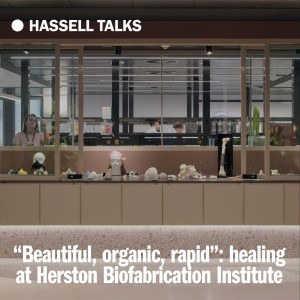
Wednesday Jun 15, 2022
Wednesday Jun 15, 2022
While technology rapidly advances — people, by contrast, remain constant.
Creatures of habit, we need others to survive. We are the sum of our skin, our organs and body parts. Our minds distinguish us, and our intelligence is key to survival but it's our ability to work together that tells the true story of our potential.
The team behind the Herston Biofabrication Institute in Brisbane, Australia knew this, and deliberately removed the physical and mental limits in their way. Given the right space, resources and design they've seen a patient able to talk for the first time in 30 years; a specialist design-print-test-iterate a medical solution in days rather than months — and problems solved “beautifully [and] organically” in minutes.
In this episode of Hassell Talks, Mathilde Desselle General Manager of the Herston Biofabrication Institute, tells Carolyn Solley of how the transparency and malleability of the building’s interior design has smoothed interactions and increased healing and recovery enabling both patients and the Institute’s multi-disciplinary workforce to thrive.
Hassell acknowledges the Jagera and Turrbal people as the original custodians, designers, and placemakers of the land we recorded this episode on. We pay our respect to the traditional owners, their elders and knowledge holders past, present, and emerging. Their knowledge has and will ensure the continuation of cultures and traditional practises.
This episode was produced by Prue Vincent and Michelle Bailey
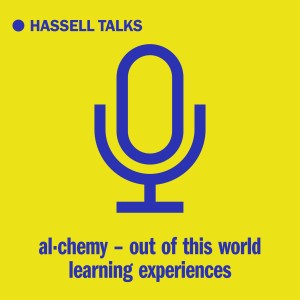
Wednesday Apr 27, 2022
Wednesday Apr 27, 2022
What does bouncing Kraftwerk’s music off the surface of the moon have to do with the future of the university campus?
Universities are paying close attention to the way interstellar music-science-arts-technology-culture experience makers bluedotfestival engage audiences in cross-disciplinary learning. But how far do they need to go on campus?
Turns out - they need to create a 'wow' factor deeply rooted in curiosity and learning.
Who better to debate the future of the university campus than Hassell's co-lead of Education and Science, Julian Gitsham, together with the creators of bluedot, Professor Teresa Anderson and Professor Tim O’Brien of the University of Manchester's Jodrell Bank.
In this episode we hear how to look at the benefits of designing environments around problem solving – rather than disciplines – and how good design can create and facilitate inclusive, innovative, and problem solving campuses.
LinksCultural chemistry on campus web pagebluedot festivalFirst Light PavilionJodrell Bank Observatory
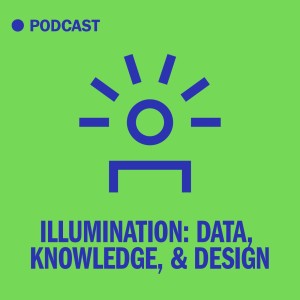
Wednesday Mar 16, 2022
SPECIAL EPISODE. MTalks presents: Illumination - data, knowledge and design
Wednesday Mar 16, 2022
Wednesday Mar 16, 2022
To celebrate the start of Melbourne Design Week, we’re excited to share a podcast from Australia’s leading architecture commission MPavilion.
The MPavilion MTalks series brings some of Melbourne’s brightest and most creative minds together on the lands of the Eastern Kulin Nation, to debate, share ideas and be inspired. The episode you're about to hear was part of an 'Illuminating' event exploring the role of data, knowledge and design in amplifying access to the ideas moving around the city.
Hear from the event creators, architects, artists, lighting and interaction designers exploring the role of design in illuminating and engaging people in public institutions.
With thanks to MPavilion for sharing this episode with us, as well as Bonnie Shaw at Place Intelligence for leading the event. Thanks also to FreeState's Su Lim, Hannah Fox at Rising, Tim Hunt at Arup, and Finding Infinity's, Ross Harding for taking part - and Steve Coster for hosting.
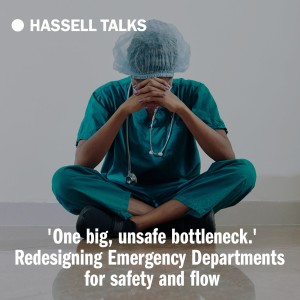
Monday Feb 28, 2022
Monday Feb 28, 2022
Even before Covid-19, many working in the health system would claim that Emergency Departments weren’t in the best of health.
The narrative in the media, and from clinicians themselves, paints a picture of overcrowded spaces, overwhelmed and unsafe for patients and staff, bottlenecked and stretched beyond capacity yet growing bigger – and bigger - but not necessarily smarter. Creating healthcare systems that meet the very best expectations and conditions for staff and patients should be a focus for communities and operators, and this involves examining the models of health, safety, privacy, the popularity of telehealth and the role of emerging technologies.
As part of a WomenIn_ panel event hosted by our Melbourne studio, we invited Mya Cubitt, Emergency Physician at the Royal Melbourne Hospital, Stefano Scalzo, from the Victorian Health Building Authority, as well as Health, Infrastructure and Planning Consultant Brian Stevenson, to join Hassell's Health sector leader Leanne Guy and Managing Director Steve Coster to discuss the ever changing needs of Emergency Departments.
This episode was produced by Prue Vincent and Annie Scapetis.
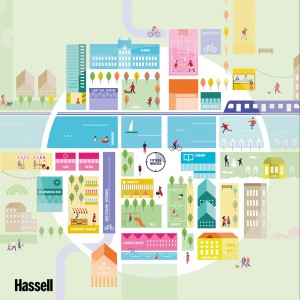
Thursday Feb 10, 2022
Thursday Feb 10, 2022
Cities around the world are committing themselves to creating compact, amenity-rich neighbourhoods as they tackle the challenges of climate change, urban sprawl and wellbeing.
Ireland’s cities, with their history, natural amenities and passionate residents seem more ready-made than most to embrace an agenda of compact growth. But despite national planning frameworks in place, local governments, private developers and stakeholders are encountering ongoing challenges of their own in bringing “15-minute cities” to fruition.
“If we’re going to get people to accept the idea that it’s good to live in a smaller home in the city centre, we have to make sure that the experience outside the front door of their smaller home is really wonderful,” explains City of Dublin Architect, Ali Grehan.
In this episode of Hassell Talks, Senior Researcher Camilla Siggaard Andersen speaks to the people behind the push for compact, urban growth in Ireland: the property developers, city architects, academics and researchers, who want to move beyond a common assumption that compact growth can only come from sacrifice.
As Hassell’s “Close to Home” report shows, 15-minute cities provide opportunities for more convenient living, more equitable communities and more sustainable development, saving resources and reducing emissions because of higher density.
Could this be a new era of urbanism, for Ireland?
Our thanks to Brian Moran, Ali Grehan, Pat Farrell and Niamh Moore Cherry for sharing their insights with us.
This episode was produced by Camilla Siggaard Andersen and Prue Vincent with support from One Fine Play.
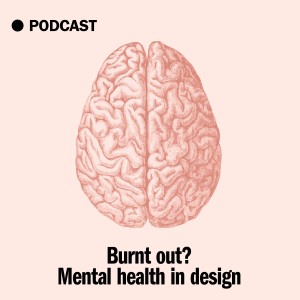
Thursday Sep 09, 2021
Burnt Out? Mental health in design
Thursday Sep 09, 2021
Thursday Sep 09, 2021
Mental health is making headlines - including in the architecture and design industry as the cumulative effects of living and working through a second year of the global Covid-19 pandemic start to become known.
So how can organisations, the industry, and individuals, take advantage of this moment to establish change and in doing so, protect the longevity and diversity of the design industry into the future?In this special episode of Hassell Talks to recognise RUOK Day and World Mental Health Day we invited Parlour co-founder, Researcher and Professor of Architecture at Monash University Naomi Stead to share some of the early observations coming out of a survey of 2300 industry professionals into wellbeing in architecture.
Joining Naomi is landscape architect, Place Intelligence co-founder and Human Potential Coach Bonnie Shaw, who explains how her own extreme experience with stress and pursuit of mental wellbeing marries data, endocrinology, neuroscience and behavioural psychology to support change, and community resilience.Together with Managing Director Steve Coster they explore opportunities to promote an open help-seeking culture, foster wellbeing and create real, positive change around mental health for the benefit of individuals, organisations, clients – and ultimately the communities and end users of design.
"Designers are motivated by a desire to make the world a better place, and so they keep designing until they get to the best possible outcome beyond the point where they're really pushing their own personal well-being." - Naomi Stead
"When you're working in really big, challenging adaptive problems, it puts so much pressure on people. And being able to do that work in a context where it's okay to talk about how you might be struggling or when you might be having problems, I think, is the only way we get through it." - Bonnie Shaw
Hassell is a proud partner of mental health advocacy organisation, PukaUp. Find out more about the work PukaUp is doing to eliminate suicide.
References and further resources
The British Architects Mental Wellbeing Forum ToolkitThe Australian Architects Mental Wellbeing Forum ToolkitLiterature review on Architects and Mental Health commissioned by the NSWARBMonash University's Wellbeing in Architecture surveyBonnie Shaw: 'Making good decisions' - Dumbo FeatherFounder of Stress Theory, Hans Selye
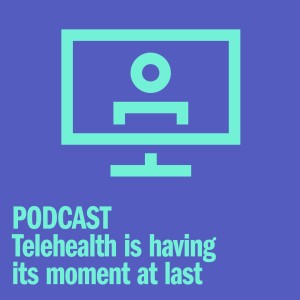
Friday Jun 18, 2021
A shot in the arm: How COVID-19 transformed telehealth and hospital design
Friday Jun 18, 2021
Friday Jun 18, 2021
Finding it both necessary and convenient, patients and clinicians across Australia embraced the change brought about by COVID-19 and took to telehealth in huge numbers – jumping from one million service events in March 2020 to six million a month later in April.
Healthcare is traditionally an area that can be slow to change, so this leap in uptake was a novel event in itself.
Under pandemic restrictions, clinicians didn’t have much of a choice. But the switch to telehealth wasn’t as simple as just turning on a computer or making a call, particularly in hospital settings where space and infrastructure are hard to come by.
We wanted to find out what the telehealth experiences of healthcare workers in Australian hospitals was like during 2020, and the implications for the spaces we design.
In collaboration with The University of Queensland’s Centre for Online Health, we discovered that hospital infrastructure in Australia is ill-equipped to accommodate the spaces needed for successful delivery of telehealth services during a pandemic. And with telehealth here to stay, that means these spaces are also left wanting in a future that is almost certain to include a greater mix of both in-person and telehealth consultations.
For episode 3 in season 2 of Hassell Talks, Senior Researcher Michaela Sheahan looks at what this means for the way new hospitals are designed or existing hospitals are reconfigured – and the almost once-in-a-lifetime opportunity to rethink the way healthcare is offered. She’s joined by Hassell Principal Leanne Guy as well as Karen Lucas, Senior Telehealth Coordinator for Metro South Hospital and Health Service and Dr Emma Thomas, Research Fellow at the Centre for Health Services Research, The University of Queensland.
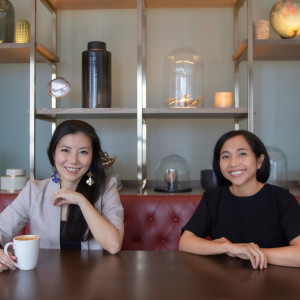
Friday May 28, 2021
Connection, trust and safety: co-working and COVID-19
Friday May 28, 2021
Friday May 28, 2021
At the heart of any co-working environment is the idea that it can do much more than provide a hotspot and a hot coffee.
The best ones ask: Can we build a great like-minded community?
In the COVID-19 context, the best co-working spaces then ask whether they can solve some of the challenges thrown up by the pandemic to design for safety and trust in a physical environment.
And right now? They’re asking how the design of their spaces helps people to connect – and reconnect. To go a step further and make these connections high value, while supporting wellness and resilience.
“You need a place where you can say 'Oh my gosh! That's so good!' You need that energy.”
Industry trailblazer, CEO and Founder of The Great Room Jaelle Ang, calls it the quest for a ‘modern agora’.
“If we need to move at a fast pace, we need to be in a learning environment,” she observes. “And the office needs to allow you to do that.”
Host and Senior Design Strategist Pamela Jouwena joined Jaelle Ang at the Great Room, Raffles for a conversation exploring the evolution of coworking to meaningfully connect the virtual and physical experiences – and how it’s gone beyond simply providing flexibility to being places of resilience that people can trust, where they can create community and focus on holistic wellness. At a time when it’s needed most.
This episode of HassellTalks was produced by Prue Vincent and Slavica Habjanovic.
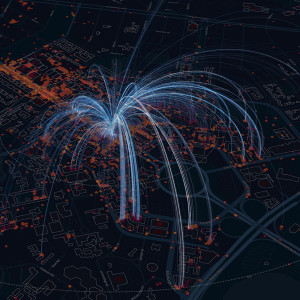
Tuesday Mar 16, 2021
How big data can challenge - and validate - the design process
Tuesday Mar 16, 2021
Tuesday Mar 16, 2021
We're back for Season Two of Hassell Talks - thanks for joining us!Once practically unthinkable, silent city centres were a feature of 2020. And to attract people back as the COVID-19 recovery picks up pace across the globe, the challenge lies in truly understanding how and why spaces work.
The solution might be staring us – city shapers and designers – in the face. Big Data.
What exactly can big data reveal to city shapers and designers that they previously never had access to? What does it tell us about human behaviour in urban places and the opportunities to create better outcomes for stakeholders? And how does it help designers prove their effectiveness of their designs?
With Big Data as a basis, designers and clients can have more informed and meaningful conversations to help generate socially, culturally and economically valuable outcomes.
Hassell's Gerard Corcoran teams up with Norion Ubechel from Place Intelligence to dig into the role of Big Data and how it can challenge and validate the design process.
This episode of Hassell Talks was produced by Prue Vincent and Jessica van Hecke
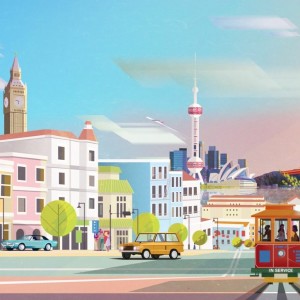
Monday Mar 08, 2021
Monday Mar 08, 2021
We don’t know exactly what our lives, work and communities will look like post COVID-19. But one thing we’re sure of is that some of the trends we saw developing over the past few years have only accelerated since the global pandemic took hold.
They’re trends that are changing how we reimagine or repurpose spaces, think about mobility, and connect with each other and our communities – not to mention increase the appeal of a slowed-down culture. These shifts all have implications for the way people are interacting with places – and as designers this is a time to listen and partner with clients and communities to help us all re-emerge resilient. For this episode of our podcast, we’re joined by our good friend and collaborator David Grant of Brickfields Consulting. As consumer research experts, David and his team have been delving deeper into these trends, giving our clients and designers extra insights into the people who will use the places we create. David joins Hassell Principals Angus Bruce, Liz Westgarth, Chong Wang and Richard Mullane to discuss the impact and opportunities for cities from San Francisco to Sydney and Shanghai to London.
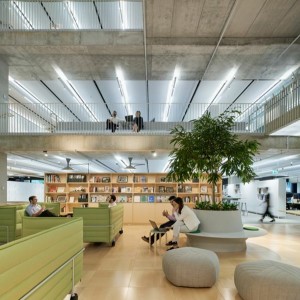
Tuesday Dec 15, 2020
The role of data in workplace design in the era of COVID19
Tuesday Dec 15, 2020
Tuesday Dec 15, 2020
Whether you’re a CEO, a property manager or a workplace designer, the office has been the headline conversation of 2020. How many will go back? What will it look like? How will workplace culture change?
Whatever line of inquiry you follow, we know a mix of qualitative and quantitative insights will give us the greatest handle on what’s happening in a workplace.
Evodia Alaterou, our design strategy lead joins Alex Birch, co-founder and CEO of tech start-up XY Sense to discuss what they’ve learned gathering data from four workplace and employee experience leaders in Australia.
And we get to hear directly from people inside those businesses too: Cameron McIntosh from Arup, Madeline Mios from Culture Amp, Mark Comer from Cbus and Adam Fitzhenry from Sunsuper all talk about the challenges their organisations faced – and how those made them re-think the tools they use to understand and measure their workplace performance and their culture.
It’s a topic we’ve been examining closely, in everything from our Workplace Beyond 2020 survey to one of our latest podcasts – a ‘Creative Conversation’ on the future of corporate campuses.
Hassell Talks is brought to you by international design firm Hassell.
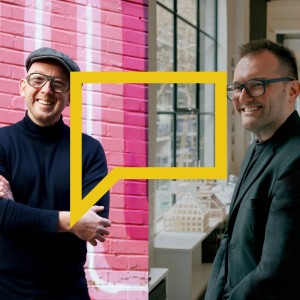
Saturday Dec 12, 2020
What’s next for workplace campuses?
Saturday Dec 12, 2020
Saturday Dec 12, 2020
How can corporate campuses lure us out of our homes (and pyjamas) and back to the office in a COVID-wary world? And how will they keep us coming back, with remote working more compelling or essential than ever?
Some designers say the ‘hardware’ of a campus is what makes it magnetic. For them, it’s about the architecture, spaces and settings that give form to a company’s aspirations and reflect the best of its people and location. Others would argue the secret’s in the ‘software’ - the less visible elements like programming and technology that make a campus dynamic, inspiring and often surprising. But the magic could come down to the mix. An irresistible environment with unmissable experiences.
These are the questions that fire up two of our design minds and frequent campus collaborators - Rob Backhouse, Head of Design here at Hassell, and Adam Scott, Executive Creative Director of experience master planners FreeState, part of our design family.
In this podcast - a rollicking ‘Creative Conversation’ like the ones we have around the table (and sometimes late into the night) - Rob and Adam share their insights on what’s next for large-scale workplaces. In the process, they also tell us what ‘Field of Dreams’, theatre productions and a shaman in a cave might teach us about a campus people can’t resist - post-COVID and beyond.
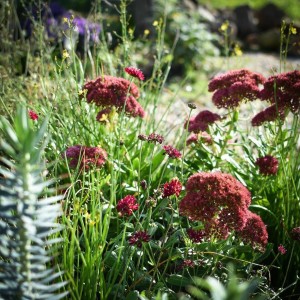
Thursday Nov 19, 2020
Thursday Nov 19, 2020
Plants in our cities are important for many reasons, like supporting urban cooling and biodiversity as well as human wellbeing and health.
But they also impact on the economies of our cities. Green cities are just as attractive to developers and investors as those who just want to stop and smell the roses.
Parts 1 and 2 looked at why we value wild, natural planting in our cities as well as the importance of scale, ecology and sustainability when creating landscapes that appear natural and organic.
In part 3, Jon Hazelwood joins writer, garden designer and TV presenter Michael McCoy as well as Professor Nigel Dunnett, responsible for some of the UK’s most spectacular planted environments to explore the significance of our emotional connections to nature in cities.
Hassell Talks is produced by international design studio, Hassell.









